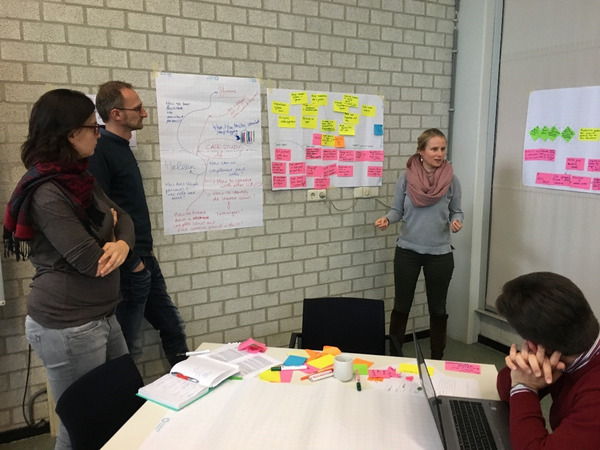In the first round of workshops, participants prepared to further develop the collaboration with local case study actors based on an analysis of opportunities for, and impediments to, diversification. After elaborating the results with the case study actors, the second round of workshops will enable the teams to develop intervention strategies and monitor progress to support learning. Connections will be made with analytical DiverIMPACTS work packages, which will be further elaborated during the first annual meeting. The third round of workshops will take place after the first year of activities and will enable actors to capitalize on, and expand, the learning-for-innovation tools and approaches, to enhance effective guidance of change.
Increasing crop diversification is not only an on-farm agronomic challenge. It also involves re-organizing the system beyond the farm level. Without, for example, a sufficiently diverse supply of cultivars, machines sensitive to spatial diversity, diversity-sensitive advice, values chains and regulations that support farmer efforts, and sufficient consumer demand, growing a greater diversity of crops will remain at best a dream for the majority of farmers. Such broad (some say ‘systemic’) changes beyond the farm level are not inherent to the professional routines of businesses, farm advisors, intermediaries or researchers working with farmers. In DiverIMPACTS this has prompted so-called ’co-innovation workshops’, in which a way of working is proposed, implemented and improved that takes into account that crop diversification requires changes in ‘normal behaviour’ of many actors in the agricultural system simultaneously, as well as of case study management that is sensitive to the vagaries of innovation processes.
A key concept of the project management approach in the co-innovation workshops is adaptive planning. A project is seen as something that evolves to a substantial degree beyond the control of the project leader, whose role is to benefit from opportunities that open up, in order to advance to the project aims and reduce disturbances that do not contribute to progress. This approach means that project managers must reflect on the project context, and on consequences of activities for people’s motivation and behaviour. For this purpose the DiverIMPACTS case study teams have a monitor to support the case study leader. While the case study leader can focus on organizing, motivating, and getting things done, the monitor supports learning and thinking about the link between activities as well as the relationship between the case study and the vision. Three rounds of co-innovation workshops will take place.
The first round took place at 5 different locations in Europe between October and December 2017. At each location the same 3-day workshop was held with one of the five case study clusters. In order to ensure that case study actors become fully involved, they need to see the benefits of the case study for their own diversification aims. To this end, the leaders and monitors of the case studies worked to develop their idea of what their case study could look like using project management tools provided by the team of Wageningen Research in Lelystad. These tools focus on developing a vision, mission, and causal analysis, as well as defining entry points for activities. In addition, stakeholder analysis and interaction skills were honed. The results of the workshops were presented as ‘practice’ for the case study leaders to implement the workshop approach (not the workshop results!) with actors in their case studies. The first round of workshops are seen as the start of a phase of exploration between the project and the case study actors, to find out which activities generate the most commitment and energy, and which activities are needed to bring about more diversified cropping practices.
At the end of the exploration phase the case study actors will have developed a tentative plan for joint activities that will be input for the second workshop round, which will take place between January and April 2018. By then, the case study teams are expected to have a much clearer idea of their case study’s aims and how to measure progress towards it, both in terms of material changes and in terms of changes in people’s attitude and behaviour. During the second workshop round, knowledge that can be provided by other workpackages of DiverIMPACTS will be matched with the needs of the case studies. Here, the other DiverIMPACTS workpackages will build on their understanding of the case study issues developed during the first round of workshops. The result of the second workshop round are propositions for action. After the workshops, the case study teams will discuss these propositions with the actors in their case study to arrive at an agreed course of action for the first year. At the next DiverIMPACTS annual meeting in June 2018, the plans will be presented and peer-reviewed, and linkages to the project at large will be developed.
The third round of workshops will take place during winter 2018/2019. During the third workshop, progress as well as innovation management will be reviewed, and approaches will be strengthened. This will lead to an adjusted course of action for year two. In the meantime, contact among the case studies will remain active through the cluster leaders, who will touch base with the case study teams every 2-3 months and connect case studies according to similar experiences and problems. The cluster leaders themselves are connected through the learning for innovation platform, which allows reflection and learning about innovation management supported by its own monitor.

 tap and then scroll down to the Add to Home Screen command.
tap and then scroll down to the Add to Home Screen command.